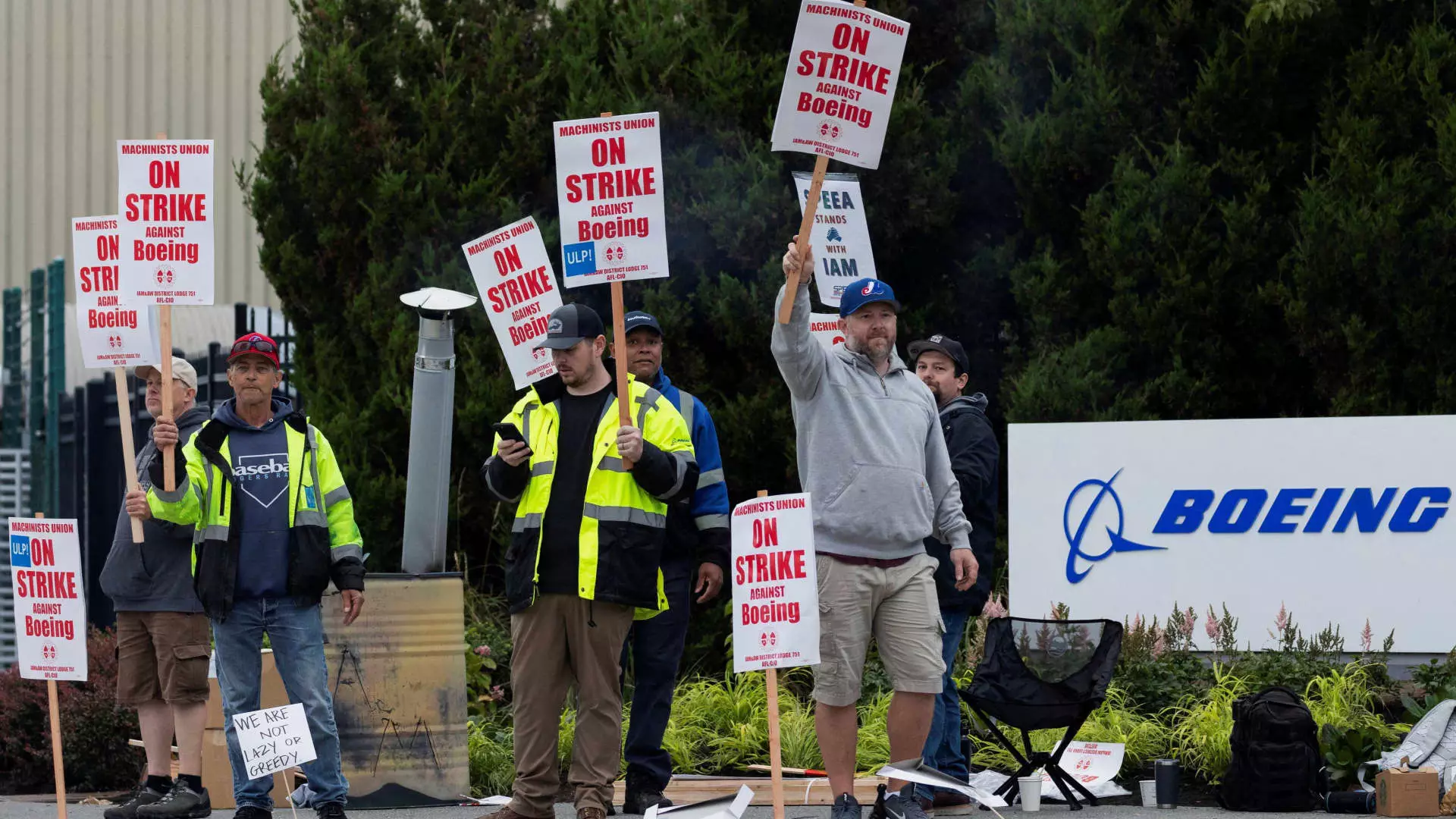The ongoing machinist strike at Boeing, a titan in the aerospace industry, has underscored a crucial dilemma facing both employees and management. The unfolding conflict spotlights not only the struggles of labor for fair wages but also the existential challenges confronting a company with a checkered financial history and an increasingly competitive labor market. With thousands of workers walking off the job in search of better compensation, the stakes have never been higher for both the machinists and Boeing’s future.
From a financial standpoint, the strike could not have come at a worse time for Boeing, which has been grappling with a staggering debt of around $60 billion. Estimates suggest that the work stoppage is costing the company approximately $50 million a day. Given this backdrop, the urgency to forge an agreement that satisfies the demands of the machinists while also protecting the financial viability of the company is palpable. Any extended labor dispute not only threatens to deepen Boeing’s financial woes but may also lead to a downgrade in its credit rating, further inflating borrowing costs and complicating its already precarious financial landscape.
Compounding these issues is the company’s volatile history in recent years, which has seen Boeing fail to post a profit since 2018. With high-profile manufacturing crises and a series of production delays, the current strike could deepen the rift between Boeing and its suppliers, escalating the challenges in fulfilling existing contracts and customer demands.
While Boeing’s plight is stark, the machinists’ challenges are equally pronounced. Many workers have expressed feelings of financial vulnerability exacerbated by the high cost of living in the Seattle area. As they strike for better wages—close to the 40% increase proposed by their union—some have begun considering side jobs in landscaping, furniture moving, and other labor-intensive sectors. It speaks volumes about the desperation felt among these workers when mechanics, who normally take pride in their skilled labor, turn to food delivery or other manual jobs merely to maintain a semblance of financial stability during a strike.
The conditions reported at the local union office reveal a community resourcefully preparing for a prolonged labor dispute. The sight of union members bringing in large pallets of water and preparing meals highlights the solidarity among the workers. Yet it also emphasizes the grim reality of their situation: they are readying themselves for what could become an extended hardship, leaving behind the very jobs that many have dedicated their lives to, in search of equitable compensation.
This strike is not an isolated incident but a part of a broader trend in which workers from various sectors have fought for improved working conditions and fair pay. From entertainers to autoworkers, recent labor disputes have often culminated in workers securing notable wage increases. Yet, unlike past battles, this strike comes at a time when Boeing finds itself in a particularly vulnerable position due to labor shortages in the skilled trades—a unique challenge amid a broader recovery in the aviation industry post-pandemic.
Furthermore, the current political climate, exemplified by the involvement of the Biden administration, places additional pressure on both management and labor to reach a resolution. Transportation Secretary Pete Buttigieg’s comments highlight the administration’s interest in ensuring a deal that balances the needs of the workers with the operational demands of Boeing, a company deemed crucial to both the economy and national security.
Negotiation Challenges
Negotiating on the heels of critical financial and operational challenges complicates dialogues substantially. With Boeing’s proposals—including a 25% wage increase over four years—met with disappointment by union negotiators, the gap between expectations and offerings remains wide. Key sticking points, such as the restoration of previously lost pensions and the inclusion of annual bonuses, remain unresolved even as both parties share a common goal of resuming production.
Boeing’s new CEO, Kelly Ortberg, while pledging commitment to meaningful negotiations, faces the challenge of navigating through a complicated labor landscape where employees feel their top concerns are not being adequately met. The disappointment expressed by union representatives indicates that mere assurances may not suffice to placate the workforce, suggesting that substantive changes must be on the table to rebuild trust.
As this strike unfolds, both Boeing and its machinists are caught in a complex web of urgent financial realities and the ongoing demand for equitable treatment in the workplace. The broader implications of this standoff stretch beyond the walls of Boeing’s factories, resonating with workers and companies across industries. In a rapidly evolving labor landscape, how Boeing responds to the demands of its machinists will serve as a critical indicator of its willingness to adapt, prioritize employee welfare, and ultimately redefine its corporate ethos in a time of crisis.


Leave a Reply